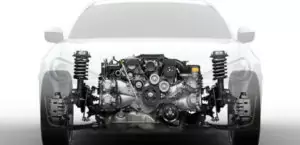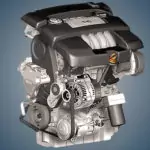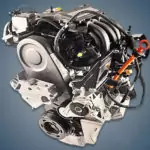The 1.8-liter Volkswagen RP mono-injection engine was produced from 1986 to 1993 and was installed on the second Golf or Jetta similar to it, as well as the Passat B3 and Seat Toledo. There were modifications of the unit with two types of injection: Mono-Jetronic and Mono-Motronic.
The EA827 1.8l series includes: RP, AAM, ABS, ADZ, PF, ADR, ARG, AEB, ANB.
Specifications
| Production years | 1986-1993 |
| Displacement, cc | 1781 |
| Fuel system | single injection |
| Power output, hp | 90 |
| Torque output, Nm | 142 |
| Cylinder block | cast iron R4 |
| Block head | aluminum 8v |
| Cylinder bore, mm | 81 |
| Piston stroke, mm | 86.4 |
| Compression ratio | 9.0 |
| Features | SOHC |
| Hydraulic lifters | yes |
| Timing drive | belt |
| Phase regulator | no |
| Turbocharging | no |
| Recommended engine oil | 5W-40 |
| Engine oil capacity, liter | 3.8 |
| Fuel type | petrol |
| Euro standards | EURO 1 |
| Fuel consumption, L/100 km (for VW Passat 1990) — city — highway — combined |
11.0 7.6 8.8 |
| Engine lifespan, km | ~350 000 |
The engine was installed on:
- Volkswagen Golf 2 (1G) in 1987 – 1992;
- Volkswagen Jetta 2 (1G) in 1986 – 1991;
- Volkswagen Passat B3 (31) in 1988 – 1991;
- Seat Toledo 1 (1L) in 1991 – 1993.
Disadvantages of the VW RP engine
- Most of the problems of this engine are associated with the vagaries of the mono injection system.
- The reason for the unstable operation of the motor is usually air leakage or sensor failures.
- In second place are failures in the ignition system, see the distributor or wires.
- Saving on oil service often results in the replacement of hydraulic lifters.
- After 200 thousand km, oil consumption often appears due to stuck piston rings.






